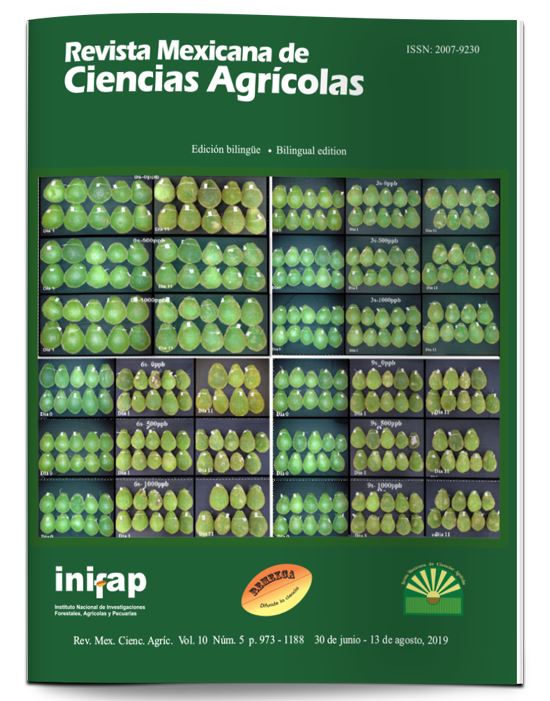Presence of enterobacteria in agricultural inputs in La Comarca Lagunera
DOI:
https://doi.org/10.29312/remexca.v10i5.1812Keywords:
E. coli, Klebsiella spp, Salmonella spp., agricultural safeAbstract
The global food trade situation forces exporting countries to strengthen their control systems and adopt and monitor safety control strategies based on the risk of contamination. The objective of this research was to isolate enterobacteria in various inputs used in agricultural production in La Comarca Lagunera and to determine the risk involved in its use in agricultural activities. Samples were microbiologically analyzed from different sources of water, manures and soil, used in the agricultural production of La Comarca Lagunera, Mexico, during the years 2014-2016. Klebsiella spp. to was identified as the main risk factor of bacterial contamination in water that is used for irrigation of different crops with a prevalence of 46.95%. In the soil samples, only Klebsiella spp. with a prevalence of 60%, while in samples of bovine manure E. coli (30%) and Klebsiella spp. (40%), Salmonella spp. (14%) in goat manure, and Salmonella spp. (100%) in chicken manure. The above represents a risk factor for the health of the final consumer, in the case of producers who intend to export their agricultural products, they would reduce competitiveness and could close international markets. Further investigation is necessary along the fruit and vegetable production chain in order to reduce this contamination.
Downloads
Downloads
Published
How to Cite
Issue
Section
License
The authors who publish in Revista Mexicana de Ciencias Agrícolas accept the following conditions:
In accordance with copyright laws, Revista Mexicana de Ciencias Agrícolas recognizes and respects the authors’ moral right and ownership of property rights which will be transferred to the journal for dissemination in open access. Invariably, all the authors have to sign a letter of transfer of property rights and of originality of the article to Instituto Nacional de Investigaciones Forestales, Agrícolas y Pecuarias (INIFAP) [National Institute of Forestry, Agricultural and Livestock Research]. The author(s) must pay a fee for the reception of articles before proceeding to editorial review.
All the texts published by Revista Mexicana de Ciencias Agrícolas —with no exception— are distributed under a Creative Commons License Attribution-NonCommercial 4.0 International (CC BY-NC 4.0), which allows third parties to use the publication as long as the work’s authorship and its first publication in this journal are mentioned.
The author(s) can enter into independent and additional contractual agreements for the nonexclusive distribution of the version of the article published in Revista Mexicana de Ciencias Agrícolas (for example include it into an institutional repository or publish it in a book) as long as it is clearly and explicitly indicated that the work was published for the first time in Revista Mexicana de Ciencias Agrícolas.
For all the above, the authors shall send the Letter-transfer of Property Rights for the first publication duly filled in and signed by the author(s). This form must be sent as a PDF file to: revista_atm@yahoo.com.mx; cienciasagricola@inifap.gob.mx; remexca2017@gmail.
This work is licensed under a Creative Commons Attribution-Noncommercial 4.0 International license.



